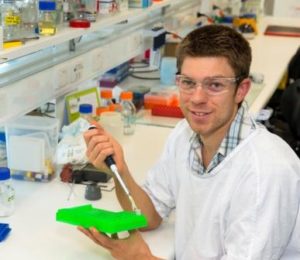 Research that aims to develop therapeutic products from traditional Aboriginal plant-based medicines has been extended by a major grant from the National Medical and Health Research Council to Dr Bradley Simpson (pictured).
Research that aims to develop therapeutic products from traditional Aboriginal plant-based medicines has been extended by a major grant from the National Medical and Health Research Council to Dr Bradley Simpson (pictured).
The NHMRC has awarded Dr Simpson the Aboriginal Torres Strait Islander Health Research Fellowship, which is worth $299,564 over four years.
Based at the Flinders Centre for Innovation in Cancer, Dr Simpson’s pharmacological research is being conducted in collaboration with the Chuulangun Aboriginal Corporation in central Cape York Peninsula, Queensland, and with scientists at the University of South Australia.
Dr Simpson said while scientists frequently collect and analyse native plants, this project is “quite unique” as it was initiated by Northern Kaanju traditional owners, who were interested in exploring their natural resources, including plants, for potential commercial and employment benefits.
To date, analytical research has focused on Dodonaea polyandra, known as ‘Uncha’, a native plant traditionally used to treat toothache.
“And sure enough, after testing the plant in the laboratory we identified active compounds with quite potent anti-inflammatory properties,” Dr Simpson said.
The compounds are now being patented with a view to creating new treatments for skin conditions such as psoriasis and dermatitis.
If the components are successfully developed into a commercial product, Dr Simpson said the intention is that bush harvesting and some initial processing would be undertaken by Northern Kaanju people, and ideally would become the basis for small to medium-sized business enterprises.
“There’s been quite a bit of work done on native plants in Australia, but the way in which it’s been done hasn’t always been appropriate in terms of the Indigenous people. They’ve sometimes been left out of the equation,” Dr Simpson said.
”We’re trying to improve and develop an appropriate model that others may be able to use, one that will improve the livelihoods of Indigenous people while combining it with science.”
Dr Simpson said the overarching project presents the possibility of “years and years, and possibly decades” of future research.
“The Northern Kaanju homelands are a habitat for many endemic species – plants that really aren’t found elsewhere in the world or in other regions of Australia. That in itself hypothetically gives rise to the potential for finding novel products based on the plants that they use,” he said.
As well as screening of new plants, the research funding will allow current analysis of other plants to be broadened. Work at the Flinders Centre for Innovation in Cancer will focus on finding compounds with applications relevant for cancer treatments and therapies, while the University of South Australia researchers will carry out screening for other biological applications.

